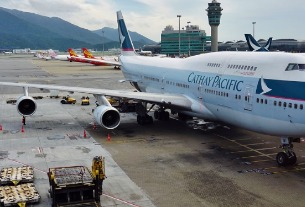Airlines have long helped each other sell tickets, using pragmatic arrangements called interline agreements and strategic marketing deals called codeshares. But new technology is offering fresh spins on these concepts that may make cooperation more common.
Two recent financial deals cast some light on the trend.
In September, investment firm 777 Partners bought tech firm Air Black Box, the companies revealed on Monday. Air Black Box is an internet booking engine that promises to let any pair of airlines cross-sell their flights.
777 Partners is a private investment firm with deep experience in private equity, specialty finance, fintech, insurance, and aviation.
The companies didn’t disclose deal terms. Air Black Box had received undisclosed investment from ANA Holdings, Cebu Pacific, Scoot, and Nok. The Manchester, UK-based company helps carriers like Nok and Tigerair Australia cross-sell on each others’ sites as part of a marketing effort called the Value Alliance.
Last December, Kiwi.com, an online travel agency based in Brno, Czech Republic, took a minority stake in tech firm AeroCRS, for undisclosed terms.
Kiwi.com has announced the launch of technology that will enable travellers to visit cities that can’t currently be reached by flights. This development will provide bookable itineraries with specific times and prices and not just general routing information, giving travellers the ability to find and book the optimum route, from start to finish.
In April, Kiwi will enable the 50 small to medium-sized carriers that use AeroCRS’s passenger service system to offer customers visiting an airline’s branded site the chance to book itineraries that include legs on one or more other carriers. Carriers display the mixed itineraries on an airline’s website via their own internet booking engine or an optional one from AeroCRS.
Kiwi said one airline would start cross-selling in early April but didn’t name it.
So far, low-cost carriers have been the first to embrace the tech from Air Black Box.
The parallel moves have led to gains in traffic for the smaller airports budget airlines tend to serve. Some of those airports, such as London’s Stansted, St. Peterburg’s Pulkovo, and Cologne/Bonn, have responded by taking steps to encourage carriers to adopt the tech.
Jumping Hurdles
Until now, the website of the typical small or mid-sized airline didn’t have the technical ability to cross-sell tickets or upgrades from another airline that’s a marketing partner the way giants like American Airlines, Lufthansa, and Singapore do. However, tech from Air Black Box and Kiwi’s new investment AeroCRS claim to help to overcome that obstacle.
One problem with, say, Airline X selling tickets for a flight on Airline Y is how airlines transfer checked baggage. An airport usually must assist with baggage transfer.
Air Black Box will begin offering airports the ability to link their baggage handling software to its system and begin sending updates from airlines on itineraries involving transfers. That tech would provide the details airports need to transfer bags smoothly.
But physical work at an airport in relocating equipment and passenger queues may also be needed. This spring, London’s Stansted Airport is rearranging its procedural flows so that travelers booking virtual interlined flights will not have to re-check in for their onward flight. Signs will point passengers so-called self-connect passengers (those with the virtual interlined tickets and those traveling without checked bags) to dedicated transfer lines. The British airport, which is undergoing a $767 million transformation, is partnering with Kiwi on the project, which will roll out in phases between now and June.
St. Peterburg’s Pulkovo’s aims to add baggage transfer by the end of the year, but Cologne/Bonn, which announced its move last week, hasn’t provided a timetable.
If these airports see gains, other secondary, or non-hub, airports, may also adopt the tech to compete for so-called feeder traffic.
Another problem facing airlines cross-selling flight segments flown on other airlines is how to help passengers when a flight is delayed or canceled.
Unlike Air Black Box, Kiwi uses a shopping cart approach to bundling tickets on two airlines together without creating any ability for the two airlines’ software systems to communicate with each other regarding a passenger. However, Kiwi will offer its customer support that claims to handle rebooking when things go wrong.
Airlines have long had marketing agreements to help with cross-selling, explained Madhu Unnikrishnan, editor of Skift Airline Weekly.
“The simplest pacts are interline agreements that promise to smooth the way for the transfer passengers, helping travelers in case something goes wrong and enabling the simple selling of mixed itineraries,” Unnikrishnan said. “Codeshares are complex joint marketing deals, where two carriers do more cross-marketing. Codeshares provide more seamless service, such as letting elite passengers on one airline enjoy elite privileges on the other.”
The International Air Transport Association (IATA) manages the so-called multi-lateral interline traffic agreements. More than 400 carriers, including many non-IATA members, have formed these deals, an association spokesperson said.
However, airlines also form bilateral interline agreements on their own. In the cases of Air Black Box and Kiwi, airlines don’t need an interlining deal. Air Black Box, for instance, offers airlines robust data to airline back-office systems to handle pain points, such as for the settlement of payments.
Airlines invented the marketing deals as workarounds to rules that often restrict foreign investment or limit foreign carriers from freely competing on other countries’ domestic routes, Unnikrishnan said.
Airlines may sign more such deals thanks to the spread of APIs, or application programming interfaces, a method of sharing data that doesn’t require significant implementation or maintenance resources. The tech can match a rules-based approach to itinerary creation that airlines already use, and it can cross-sell branded additional products, called ancillaries, on a multi-carrier flight — not just tickets.
Despite the promise, the verdict is still out on the new services. No one yet knows how well Kiwi’s experiments with airports will work.
Also, last November the CEO of Scoot Airways told news service FlightGlobal that Scoot’s membership in the Value Alliance, powered by Air Black Box, has yet to reap significant rewards.
But several players outside of global alliances, like AirAsia and Aer Lingus, could make interesting prospects. Southwest Airlines, for example, doesn’t participate in an alliance. But, in theory, if the largest U.S. airline by domestic passenger volume wanted to expand its reach, it could partner with another carrier. Virtual interlining may be getting real.
Read Original Article




